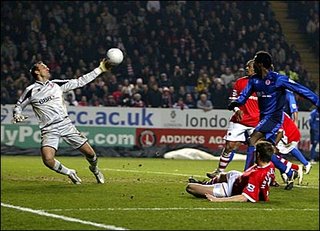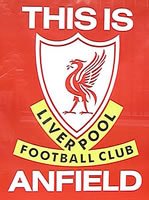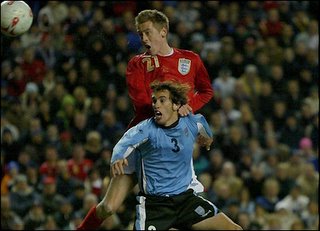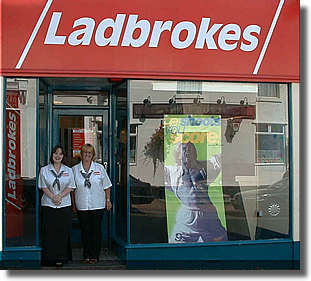
I have always been fascinated by probability and risk, and so it was hardly surprising that I developed an early interest in gambling. Naturally I shun the activity here in New York where its legality is a slightly grey area, but nonetheless I am permitted to view from afar.
Although I still struggle to believe it really happened, shortly after my eighteenth birthday I picked a 15-match accumulator at odds of 12,000-1. Sadly for me I only had 5p riding on it - still, £600 was a lot of money in those days. Although unconfirmed, based upon press reports since, I believe these may be the longest odds ever paid out on a matchday football coupon.
I rapidly learned that fifteen match accumulators were something of a rarity. Indeed, I have rapidly learned that doubles or even trebles are to be treasured and not scoffed at. As a veteran of sports betting (particularly as it relates to football), I thought that in the absence of anything interesting to say about Charlton, that I may offer some advice to any current or aspiring sports betters.
Avoid Accumulators: This may sound strange given that I achieved a 12,000-1 payout, but if there was a single piece of advice that I could offer any sports gambler, it would be this one. The typical High Street bookmaker obviously earns its profits by building a hefty profit margin into its odds. Although these margins have fallen materially thanks to online competition, they are still extremely disadvantageous.
Take our contest versus Arsenal on Saturday. William Hill is currently offering 2/7 on Arsenal, 7/1 on Charlton, and 7/2 the draw. If you translate the odds into percentages, they are implying an Arsenal win has a 78% probability, a Charlton win has a 12.5% probability and a draw has a 22% probability. Handily for William Hill, the probabilities sum to 112.5%. In other words, a 12.5% profit margin is built into the odds. In order to 'beat' these odds, a punter needs to have at least a 12.5% 'information edge', certainly possible in the short-run but near-impossible over time. To put it in perspective, the profit margin at a roulette table is only 2.7% (1/37th) yet most casino owners have reasonably high standards of living.
In other words, if a punter only gambled on single matches, he is already severely handicapped by the High Street bookmaker's odds. However once a punter tries to 'leverage' his bet by using accumulator, they are quite literally playing into the bookie's hands.
In short, if you place a treble you are obliged to 'beat' the 12.5% profit margin three times at once. Let's say you fancy a £10 bet on Arsenal, Man City and Blackburn on Saturday - a tasty home treble. The current odds at William Hill are 2/7, 10/11 and 7/10 respectively, implying a return of £41.72 (including the initial stake, ie. a profit of £31.72). However, assuming a constant 12.5% profit margin is imbedded in the odds of all three matches, the profit margin in this accumulator is not just 12.5% but a whopping 42.3% (the cube root of 12.5%).
To prove this, I will strip out the profit margin element (by dividing the odds expressed as a % by 12.5%). In the case of Arsenal, Man City and Blackburn, these are (in round numbers) 3/7, 23/20 and 10/11 implying a payout on that same £10 bet (without profit margin) of £58.63 versus £41.72 you would actually receive). And bear in mind, this is merely a treble.
For the benefit of those readers who are tempted by say a 7-match accumulator, your payout will be fully 56% (trust me on this) less than it 'should be' based upon the true probabilities. Is it it any wonder the bookies place the accumulator betting slips in such a prominent place?
Avoid Bets with Quirky Names: you know the ones, Canadians, Yankees, Patents, Heinz etc.. Basically this is a great way that the bookies steal your money through an understanding of the laws of compounding (as above) and the appeal of combination bets.
Take perhaps the appropriately named Goliath bet, made up of eight selections and 247 bets containing 28 doubles, and all accumulators upwards. On a lazy Saturday afternoon, it's tempting to put on a 10p Goliath for £24.70 and watch eight live races. Unfortunately it rapidly becomes much less enticing when your first selection falls at the last.....
When your first selection falls, you are now left with 'just' 120 bets - in short over half of your bets have been rendered worthless by the failure of a single selection. If your second nag trails in behind the winner, you are left with just 57 bets (ie. only 23% of your initial stake remains invested) and you probably haven't got up to boil the kettle yet.
Use the online betting exchanges: As any sports gambler will know, online betting exchanges have revolutionised the industry. By stripping out the middle man and charging just a small commission (typically less than 5%) for offering the software that faciliates the exchange, punters now only need to beat odds of <5%.>Betting exchanges also offer the facility to 'lay' an outcome ie. bet on an outcome not happening. This is perhaps most useful in events with large fields such as big horse races or golf tournaments. By laying a fancied (or even unfancied) entrant, you are left with a bet on every one of his opponents. Although this can be achieved with a traditional bookmaker (by betting on every entrant except the unfancied one), it is cumbersome and as stated above, the odds are not in your favour.
The only caveat to this recommendation is that it only holds for the most 'liquid' efficient markets. On markets with little betting interest, there will be an inherent profit margin built into the odds (similar to the traditional bookie) plus the 5% commission. In these instances, it makes sense to try to 'become the bookie' by offering less than generous odds on all outcomes in the hope of encouraging enough punters to take your odds, and ensuring a nice profit.
Avoid correct score bets, HT/FT bets etc..: These types of bets always jump out of a coupon because they invariably offer the longest odds available on a single match. However they typically not only have a larger profit margin built into them, the odds are also calculated based upon the experience of tens of thousands of matches, and thus near impossible to gain an 'edge' on. Whilst I believe one can assess recent form, injuries, motivation, home crowd advantage etc.. in the hope of spotting incorrect odds on a simple win/lose/draw outcome, anyone who believes they can do the same thing on say a correct score market is deluding themselves.
In order to prove this, I would draw attention to the fact that the main high street bookmakers set their correct score odds at the start of a season, and then keep them constant throughout. In other words, if you wanted to bet on a 2-2 scoreline in an obscure fixture, then so long as the bookie had odds available on the main win/lose/draw market, then it would happily quote you a price for the correct score. The bookie has a grid that tells him that if the draw is priced at say 9/4, then the 2-2 draw is automatically offered at say 14/1 (the grid is built around the experience of those tens of thousands of actual observations). If the bookie is happy quoting constant correct score odds on this basis, then in short the hopeful punter is deluding himself in believing he can spot 'wrong odds' and gain an edge.
Gamble on obscure 'special' markets: This may sound counter-intuitive based upon what has been discussed above, but in fact it is the opposite. By obscure, I don't mean 'time of the first corner' or 'number of throw ins' (all of which are priced again from the experience of tens of thousands of matches), but markets where the bookie has little or no past experience on which to set the odds.
Examples might include the Oscars, or Pop Idol or even weird markets occasionally offered like 'number of times David Beckham flicks his hair.' In these markets, the punter is no longer pitched against the extremely safe laws of statistics but is pitched in a simple head-to-head with the bookie. Here a smart punter can assess a range of 'reasonable' and 'unreasonable' odds and regularly find very good value. Anyone who realised that Brokeback Mountain was ridiculously short odds to win Best Picture based on nothing more than the accumulated opinions of film critics and actors, had a great chance to 'lay' that outcome and would have reaped the rewards.
Back the away team: Backing the away team inside the stadium used to be surefire way to gain an advantage over the bookie. The traditional bookie makes his living by firstly calculating odds correctly (then applying his margin), but also by ensuring he has a relatively 'balanced book' (this explains why bookies hate race days when all the well-backed favourites triumph).
Hence in a football stadium, knowing that 95% of the crowd will be supporting the home team (99% if Charlton are the visitors) and prone to partiality, the odds on the away team will be unusually generous in order to tempt enough punters to go against their natural inclinations, and to bet against their team.
Unfortunately these 'arbitrages' are less common than they used to be because many odds are now centrally-set by the large bookies, but it's always worth keeping an eye out for the smaller local bookie who is adjusting his odds in this way. I recall one such hapless bookie paying out 14/1 on Paul Williams to score first when he was our top scorer and in a rich vein of form.
Don't be afraid of tight odds: ...(or tight trousers). It is human nature to always seek a big payout on an unlikely outcome. However, the very best value may lie in the most probable outcomes. As an example, Chelsea are currently quoted at 3/100 on Betfair to win the title. Hence a brave punter who places £10,000 on this outcome would receive back £285 (£300 less the 5% commission). Given that the title must be won within the next seven weeks (if not sooner), this implies an annualised return of approx 23.2%, hugely outstripping the returns available in a building society cash account (and it's tax free!).
I know you've read the above and said, "What if..." but if you place enough of these types of bets, having correctly assessed the odds in each case, you will be better off in my view than keeping your capital in a cash account. I believe the 'true odds' on Chelsea slipping up are more like 1/100 (after all they only need 16 points from 9 games, and probably a lot less) yet I suspect most punters are wondering if Man Utd represent 'value' at 33/1 (they don't).
Let me make it clear, I do not recommend betting at odds of 3/100 on say a single football match or horse race where randomness can play a big role, but only in long-term markets like these where scenarios can be easily mapped out and there is time to reverse course if early indications suggest you have made a tragic mistake in your assumptions.
Bet each-way on 2nd favourites in horse races with 8 runners and a very short-priced favourite: This theme draws heavily on the work of New York Addick Sr. who found himself banned from many betting shops in the 1960s/70s once they cottoned on to this ruse. Although harder to achieve today than it was in those days, the concept remains valid.
Each-way bets contain two bets, one on the win and one on a place. The place odds are derived from the odds for a win, and in the case of 8-runner races, calculated by dividing the win odds by 5. Why 8 runner races? Because races with 5, 6 or 7 runners only pay out on the place if your selection finishes 2nd - add another horse to bring the field to 8, and the bookies will pay out on the 2nd and 3rd.
The key to understanding this concept is to realise that the way to calculate the 'real' odds on a horse finishing 2nd or 3rd are different from the way its win chances should be calculated. In short they are different markets, yet the bookie treats them as if they were the same.
To use an extreme example, if you imagine I entered a 1,500m race with Seb Coe and six of my mates, then my win odds would be essentially zero but let's call them 33/1 for the sake of simplification. However my chances of finishing 2nd or 3rd are very high (I'm a keen runner you see), perhaps more like 1/3. However a bookie would calculate my odds of being placed by dividing my extreme win odds by 5, offering generous odds of more than 6/1.
It's always worth keeping an eye out for eight-horse races with a very short-priced favourite and a clear 2nd (and even 3rd favourite). These situations are rare, but if you imagine a field with a 1/5 favourite and a 10/1 2nd favourite, then an each-way bet on the 2nd favourite would imply you have an Even money bet on the place (10/1 divided by 5, less the win bet probably foregone), along with the potential upside should the horse unexpectedly come home first.
-------------
I will stop there in the interests of not boring readers senseless. With a little bit of discipline and an understanding of those situations where the bookie's 'edge' is essentially unbeatable, and those where it's not, punters have a chance (albeit a slim one) of winning money in the long-run.
Always remember the 'default bet' is always 'no bet' - the very best sports gamblers make just a handful of bets a year, but when the odds are in their favour they push hard. These gamblers also know that even if a bet in this scenario is not a winning one, it was still a good bet. If you can get over this apparent contradiction, you stand a reasonable chance.
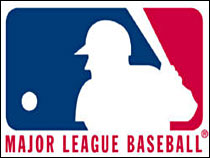 The Major League Baseball season starts up again next week with the two New York teams (Yankees and Mets) starting the season as favourites and 2nd favourites respectively. As a result, the city could well be looking forward to the first all-New York World Series finale since 2000. Amazingly the Mets will attract a full-house of 57,000 to Shea Stadium on Monday despite a lunchtime start.
The Major League Baseball season starts up again next week with the two New York teams (Yankees and Mets) starting the season as favourites and 2nd favourites respectively. As a result, the city could well be looking forward to the first all-New York World Series finale since 2000. Amazingly the Mets will attract a full-house of 57,000 to Shea Stadium on Monday despite a lunchtime start.


